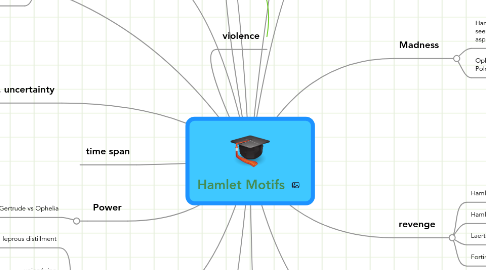
1. the bloody ending scene
2. Birth and Death
2.1. Yorik
2.1.1. 23yr old
2.2. Hamlet's Birth = Denmark takes over Norway
2.3. Hamlet's father's death is the birth of another king, Claudius
2.4. Hamlet's death is to the birth of another king in Denmark, Fortinbras
3. Poison
3.1. leprous distillment
3.2. union/wine
3.2.1. Gertrude drinks this and dies
3.2.2. sharing food or drink = union
3.3. envenomed sword
3.3.1. Laertes reveals all the truth "King is to blame"
3.4. "O, this is the poison of deep grief" (4.5.72)
3.4.1. poison leads to death: in this case Ophelia was poisoned with grief, which led to suicide.
3.5. The poison used to kill King Hamlet
4. fate
4.1. First choices then comes fate
4.1.1. Ophelia's Death: choice
4.2. Horatio: Heaven will direct it (1.4.66)
4.2.1. Horatio foreshadows everything.
4.2.1.1. He talks like a prophet.
4.3. "O cursed spite, that ever I was born to set it right!" (1.5.196-197)
4.4. "You will lose this wager, my lord." (5.2.156)
5. suicide
5.1. Ophelia Drowining
5.2. Hamlet's thoughts about suicide - "To be or not to be"
5.3. Christian's perspective regarding this issue
5.3.1. "Is she to be buried in Christian burial that willfully seeks her own salvation?" (5.1. 1-2)
5.3.2. suicide is a sin, therefore one who commits suicide does not deserve Christian burial
6. conscience
6.1. "Wherein I’ll catch the conscience of the king." (2.2.594)
6.1.1. "Oh, ’tis too true! How smart a lash that speech doth give my conscience!" (3.1.50)
6.1.1.1. conscience=feeling of guilty
7. truth vs. uncertainty
7.1. Hamlet was not sure if the ghost was trully his father's spirit or a devil playing tricks on him
7.1.1. "The spirit that I have seen / May be the devil, and the devil hath power / T'assume a pleasing shape; yea, and perhaps / Out of my weakness and my melancholy / As he is very potent with such spirits" (2.2. 587-591)
7.2. There are more things in heaven and earth, Horatio, that are dreamt of in your philosopy
7.3. the ugly truth
7.3.1. Although Hamelt tells his mother, Gertrude, that Claudius is the murder of the previous king, she seems to continue to believe in Claudius.
7.3.1.1. "As kill a king?" asks Gertrude when Hamlet tells her the truth (3.4. 31). She seems to not trust Hamlet's words.
7.4. Uncertainty of the unnatural murder -"Revenge his foul and most unnatural murder." (1.5.24)- is proven as truth.
8. violence
9. time span
10. Power
10.1. Gertrude vs Ophelia
10.1.1. Women seem to be generally powerless, but Gertrude has more power than Ophelia because she is the queen.
10.1.1.1. Gertrude's death is shown and she is a more active character than Ophelia--who is passive.
11. Wheels
11.1. Lots of words that have to do with wheels: revolution, spokes, knave, whirling (for example, see link, line 3430)
12. Dirt
12.1. water?
12.2. king's flesh in begger's belly
12.2.1. worms eat dead king
12.2.1.1. fish eat worms
12.2.1.1.1. beggers eat fish
12.3. Ophelia's dead body being burried underground
12.3.1. everyone goes back to the soil in the end.
13. Silence/Voice
13.1. ear
13.1.1. poison in the ear distorts the truth
13.1.2. Ears can represent gullibility. Claudius mentions ears a couple of times when speaking in front of his people (deceit)
13.1.3. Maybe Claudius did not literally kill King Hamlet by pouring liquid into him. Shakespeare could have meant it figuratively: Claudius could have framed King Hamlet
13.1.3.1. Whether Claudius really did or not, it tells about his use of authority. He poisons Demark's ears, by telling the untrue story.
13.1.3.1.1. "So the whole ear of Denmark Is by a forged process of my death Rankly abus'd." (775) "process of my death" would be the poisoning. Ghost is talking about how Claudius is doing the same to the country.
13.2. "The rest... is silence" -Hamlet's last words
14. revenge
14.1. Hamlet to Rosencratz and Guildenstern
14.2. Hamlet to Claudius
14.3. Laertes to Hamlet
14.4. Fortinbras to King Hamlet
15. Incest
15.1. Claudius/Gertrude
15.2. Hamlet/Gertrude
15.2.1. the Oedipus complex
15.2.1.1. Sigmund Freud
15.2.1.1.1. The idea that people are motivated by sex and aggression. (Seems to include every character in the play)
15.3. Women seem to be blamed the most. Hamlet criticizes women
15.3.1. Hamlet is constantly exposed to the bad side of women (Ophelia, Gertrude) - therefore his perspective on women is not so positive.
15.3.1.1. Frailty, thy name is woman
15.3.2. criticizes women for painting their faces that God gave them with makeup and lies
16. Madness
16.1. Hamlet feigns madness, but he seems to be really mad in aspects
16.1.1. insanity is triggered by Gertrude's marriage to Claudius plus the king's death
16.2. Ophelia becomes mad after Polonius's death
16.2.1. insanity triggered by Hamlet's refusal of her love
